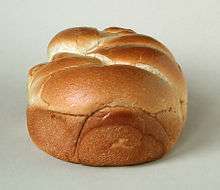brioche
English

A brioche
Noun
brioche (plural brioches)
- A type of light sweet pastry or bun of French origin.
- Hypernym: viennoiserie
- Coordinate terms: croissant, pain au chocolat, Danish pastry
- 2004, Harold McGee, chapter 10, in On Food and Cooking: The Science and Lore of the Kitchen, Scribner, →ISBN:
- French brioche dough is especially rich in butter and eggs. It's often retarded […] for 6–18 hours to stiffen it, then rolled out and briefly rested.
- A knitted cushion for the feet.
Translations
type of bun
French

brioche
Etymology
From Old French brier (“to break”) [French broyer] + -oche.
Pronunciation
- IPA(key): /bʁi.jɔʃ/
Audio (file)
Noun
brioche f (plural brioches)
Derived terms
Descendants
Further reading
- “brioche” in le Trésor de la langue française informatisé (The Digitized Treasury of the French Language).
Italian
Etymology
Borrowed from French brioche, from Old French brier (“to break”).
Pronunciation
- IPA(key): /briˈɔʃ/
See also
- cornetto m
Portuguese
This article is issued from
Wiktionary.
The text is licensed under Creative
Commons - Attribution - Sharealike.
Additional terms may apply for the media files.